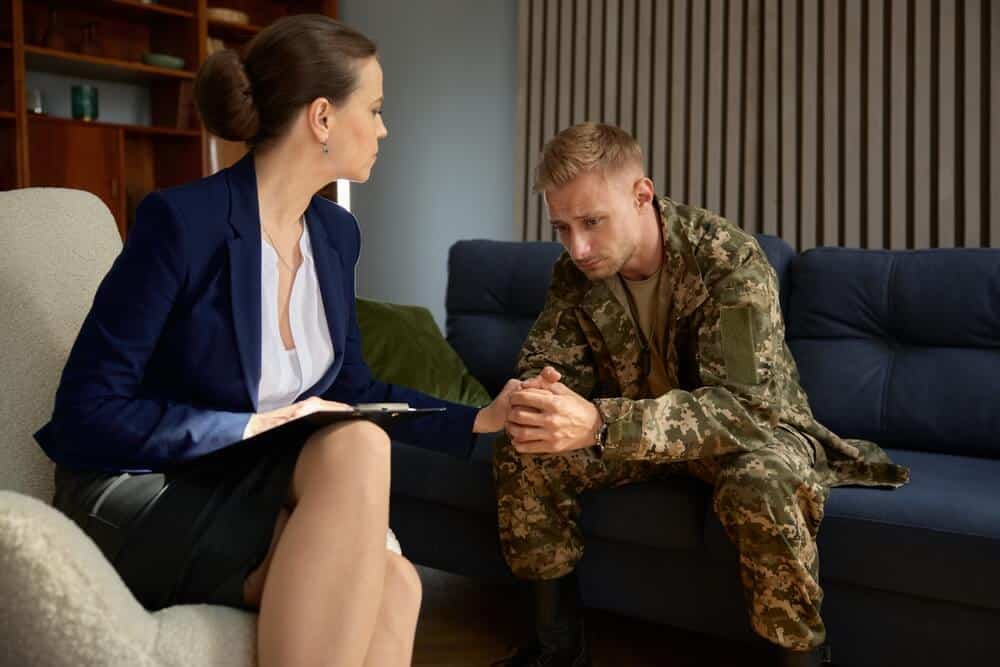The prevalence of mental health struggles among Veterans is staggering, with less than 50% of returning veterans in need of support receiving any mental health treatment, according to the U.S. Department of Veterans Affairs. Despite it being a well-known fact that Veterans face unique mental health challenges stemming from their military service, many veterans suffer in silence due to the stigma around mental health.
Professional mental health treatment for Veterans in California is crucial because these mental health conditions rarely improve without proper intervention. In fact, they can worsen over time, leading to substance abuse, relationship breakdown, employment difficulties, homelessness, and suicide.
Many Veterans return from deployment with invisible wounds like post-traumatic stress disorder (PTSD), depression, anxiety, and traumatic brain injuries. Mental health professionals with specialized training in military culture and trauma can provide evidence-based treatments that have been proven effective for veteran-specific challenges.
The following article will explore how to overcome the mental health stigma in the military and where to access proper professional treatment in California.

Why Is Mental Health Stigma So Prevalent Among Veterans?
Military culture historically emphasizes strength, resilience, and self-reliance, creating an environment where seeking help for psychological struggles is often viewed as a weakness. Veterans are trained to push through hardship, prioritize the mission, and support their fellow service members—not to focus on their own emotional needs.
The fear of being perceived as broken or damaged also drives stigma. Many veterans worry that admitting to mental health challenges might change how others see them or affect their identity as capable warriors.
This concern extends to practical consequences as well—veterans may fear that seeking mental health treatment could impact future employment opportunities, especially in fields like law enforcement, security, or government service that require background checks.
Military training intentionally builds psychological resilience through shared hardship, which creates an unintended side effect: the mindset that one should be able to overcome any challenge through sheer determination. When veterans struggle with conditions like PTSD or depression that don’t respond to willpower alone, they may feel they’ve failed to live up to their training.
The combination of these factors creates a powerful stigma that prevents many veterans from accessing professional help that could significantly improve their quality of life and well-being.
Mental Health Treatment That Works
Call 949-625-0564What Are the Most Common Mental Health Struggles Faced by Veterans?
PTSD remains one of the most prevalent mental health challenges among veterans. Combat exposure, witnessing death or injury, and experiencing life-threatening situations can trigger this condition, characterized by intrusive memories, nightmares, hypervigilance, emotional numbness, and avoidance behaviors.
Depression is also extremely common, often occurring alongside PTSD or independently. The significant transition from military to civilian life can trigger feelings of loss of purpose and identity, as well as the close-knit community that military service provides. Many veterans struggle with finding meaning in civilian work after performing high-stakes missions.
Traumatic Brain Injury (TBI) has been called the “signature injury” of recent conflicts, particularly from improvised explosive devices. Even mild TBIs can cause cognitive problems, mood changes, headaches, and difficulty concentrating. These symptoms often overlap with and exacerbate PTSD and depression, creating complex conditions that require specialized treatment approaches.
Substance use disorders affect many veterans who turn to alcohol or drugs to self-medicate symptoms of trauma, anxiety, or depression. The temporary relief these substances provide often leads to dependency, creating additional health and social problems that compound existing mental health challenges and PTSD recovery in Los Angeles.

What Resources Are Available for Veterans Struggling With Mental Health?
The VA (Department of Veterans Affairs) healthcare system offers comprehensive mental health services, including therapy, medication management, and specialized PTSD programs at medical centers and community-based outpatient clinics in California and around the U.S.
The Veterans Crisis Line (988, then press 1) provides immediate 24/7 support via phone, text, or chat for Veterans experiencing suicidal thoughts or acute mental health crises. Many Veterans don’t realize that VA care may be available even without combat experience or service-connected disabilities.
For veterans seeking peer support, organizations like Wounded Warrior Project, Team Red White & Blue, and Iraq and Afghanistan Veterans of America provide community connections and veteran-to-veteran mentoring. Many veterans find that combining clinical treatment with complementary approaches like outdoor recreation programs, equine therapy, art therapy, or mindfulness training provides comprehensive support for recovery.
The most important thing for veterans to know is that effective help is available, and recovery is possible with the right support, regardless of how long they’ve been struggling.
How Can Mental Health Support Programs Be Tailored to the Needs of Veterans?
Effective mental health support for veterans must acknowledge their unique military experiences and culture. Programs should employ providers with specific training in military culture who understand concepts like unit cohesion, chain of command, and mission focus.
Veterans often respond better to counselors who grasp military terminology, rank structure, and deployment experiences without requiring extensive explanation. This cultural competence helps establish trust quickly and reduces the sense that civilians don’t understand.
Peer support components are particularly valuable, as veterans often find it easier to open up to others with shared military experiences. Programs that incorporate veteran peer specialists alongside clinical professionals create environments where veterans feel understood and less isolated.
Treatment approaches should address the complex, interconnected challenges many veterans face. This means offering integrated care that simultaneously addresses mental health issues, physical health concerns, substance use, housing instability, and employment challenges rather than treating each in isolation.
Veterans often benefit from trauma-informed approaches specifically designed for combat-related PTSD and military sexual trauma, including evidence-based treatments like Cognitive Behavioral Therapy and EMDR. The most successful programs acknowledge that veterans’ identities extend beyond their mental health challenges and incorporate approaches that build on strengths and support post-traumatic growth.
Find Treatment for Mental Health Struggles Among Veterans at Moment of Clarity
The mental health struggles among Veterans may present a significant challenge for the private and VA healthcare system, but effective help is available. Professional treatment connects veterans with peer support networks and additional resources addressing practical needs like housing and employment.
The psychological impact of combat exposure, military sexual trauma, and the loss of fellow service members can be profound and long-lasting. When veterans receive appropriate care, they experience significant improvements in quality of life, relationships, and their ability to find meaning and purpose in civilian life.
Moment of Clarity in Southern California is proud to offer mental health treatment programs tailored for Veterans. Our Operation Clarity Treatment Program is designed to enhance mental wellness for active duty and Veterans in California and beyond. Please call us at 949-625-0564 to learn how our personalized mental health treatment services can be tailored to fit your unique needs today.
External Sources
- U.S. Department of Veterans Affairs – Many veterans’ mental health issues go untreated
- National Library of Medicine – Veteran and Military Mental Health Issues
- NAMI – Veterans & Active Duty




